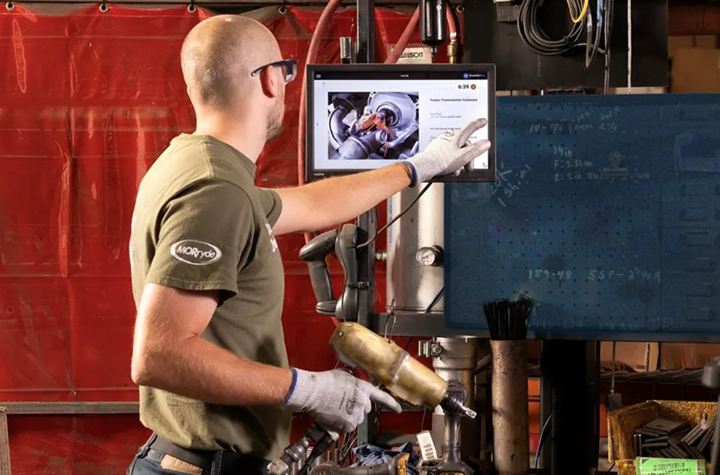The “Most Expensive Software” Holding Our Factories Back

In America's heartland, factories have long been a community lifeblood, providing economic opportunity for millions of Americans. But this path to the middle class is struggling. Despite a manufacturing boom, small to mid-sized factories across the Midwest and Rust Belt struggle with implementing smart factory technology that is critical to their long-term resilience.
While small to mid-sized factories make up 98 percent of the domestic manufacturing market, large enterprises dominate the focus of technology creators and implementation teams. The industry’s reliance on cumbersome tech to drive manufacturing operations (masked as “customized just for you”) – which costs millions of dollars, and in many cases, takes years to install – is not made with mid-sized factories in mind. American economic mobility and our once-promising manufacturing towns are suffering as a result.
But limited availability of factory technology – often known as manufacturing execution systems (MES) – tailored for SMB factories is only part of the problem. An overlooked, damaging issue remains in their complex, bloated pricing models.
Smaller factories often lack insight into the breadth of available, innovative solutions, typically defaulting to legacy systems or dismissing MES overall. This hurts their productivity, limits their access to deploy tools & technology solutions, and decreases the efficiency of our U.S. supply base.
Having led major operations at General Motors, Tesla, and Alta Motors for over 16 years, I’ve seen how misguided perceptions hinder the widespread adoption of factory floor technology. These costly pricing models with large setup & configuration fees don’t have to be the norm. Instead, we need easy to use, low-cost, high-quality approaches that augment readily available data and existing solutions on the factory floor.
What’s the Big MES Issue?
In American factories, MES is becoming mainstay to increase production and create efficiencies across assembly lines. These systems revolutionize manufacturing by connecting the tools and machines (IoT) with the people who use them, measuring shop-floor processes and digitizing pen-and-paper operations. A good solution enables connecting technologies together, not hindering or blocking the ability to do so.
The root of the issue lies in the wrongful assumption that all factory solutions operate similarly. So as these factories are confronted with sticker shock when purchasing legacy MES – costing anywhere between $100,000 and $400,000 on just software licenses – pricing can be all the reason to deter a SMB factory from implementing. Moreover, the “on-the-tag” price omits hidden expenses associated with implementation, customization, and configuration. These are often only revealed after purchasing and through a tedious sales cycle: for every $10,000 spent on licenses, manufacturers may spend close to $50,000 in services. Total costs easily exceed $500,000, all paid for before they even get to use the system in their own factory setting. This level of commitment creates a perception that MES is an unattainable luxury rather than a transformative necessity.
Imagine Buying MES on a Credit Card
Traditional pricing models that obscure cost and value are hampering our manufacturing goals. A solution lies in a respectful pricing model that aligns value with all software costs from day one of implementation. Factories need accessible pricing information to understand the true cost and value of the technology before they decide to purchase.
Pricing models should take their customers into consideration, accommodating the day-to-day lives of factory leaders in order to make this technology attainable for factories of all sizes. Its providers should consider flexible payment options (ie. monthly, yearly, and free trial periods) to alleviate the financial burden on small to mid-sized factories. Imagine the ability to buy this tech on a credit card, instead of creating a business case for CFO approval. Factories can instead update their tech needs as the added value becomes obvious during implementation.
The Opportunity for Change
Today’s perceptions surrounding factory tech pricing hinder the backbone of the American supply chain from meeting our new, unprecedented demands and restoring a once vibrant pathway to the middle class. By reshaping MES pricing models with transparency, flexibility, and inclusivity, we can empower small to mid-sized factories to begin their digital transformations. Let companies buy how they want to buy, with a pricing model aligned to value creation. Modernizing our American-made factories is key to reviving communities across the Midwest and Rust Belt.
It is time for software companies to acknowledge the diverse landscape of American manufacturing, and provide tailored solutions that align with the needs and constraints of small to mid-sized factories. In doing so, we unlock the potential for sustained reshoring and economic revitalization. The path to recreating the heyday of American manufacturing begins with ensuring MES is an instrument of progress for all.
 Ryan Kuhlenbeck, Pico MES co-founder and CEO: Pico MES Co-founder and CEO Ryan Kuhlenbeck’s career spans a wide range of automotive manufacturing at General Motors, Tesla, and Alta Motors. He has experienced firsthand the real-world issues that the digital divide creates.
Ryan Kuhlenbeck, Pico MES co-founder and CEO: Pico MES Co-founder and CEO Ryan Kuhlenbeck’s career spans a wide range of automotive manufacturing at General Motors, Tesla, and Alta Motors. He has experienced firsthand the real-world issues that the digital divide creates.
Comments (0)
This post does not have any comments. Be the first to leave a comment below.
Featured Product

